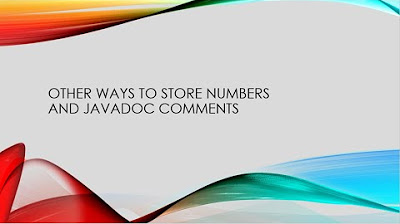What’s New in Java 23 in 2 Minutes... More or Less - Sip of Java
Summary
TLDRJDK 23 introduces 12 JEPs, including JavaDoc support for markdown, ZGC's generational mode as default, and deprecation of sun.misc.Unsafe's memory-access methods. Eight JEPs are in preview, such as primitive types in patterns, the Class-File API, and Stream Gatherers. Module import declarations, Implicitly Declared Classes, Structured Concurrency, Scoped Values, and Flexible Constructor Bodies are also previewed. The Vector API remains in incubator status, while String Templates are removed pending future improvements. Join the JDK 23 launch livestream for more details.
Takeaways
- 📖 JavaDoc now supports markdown notation, enhancing readability when viewed from source code files.
- 🔄 Generational mode is the new default for ZGC in JDK 23, with plans to deprecate single generation mode in future releases.
- ⚠️ The memory-access methods in `sun.misc.Unsafe` are deprecated and will be removed; migrate to `VarHandle` and `Foreign Function & Memory APIs`.
- 🔍 Eight preview JEPs are included in JDK 23, introducing and refining various features.
- 📝 JEP 455 introduces primitive types in patterns, simplifying the use of primitive values.
- 📚 The Class-File API is re-previewed in JDK 23 with several changes detailed in JEP 466.
- 💧 Stream Gatherers enter their second preview with JEP 473, offering a flexible gather operation for streams.
- 🌐 Module import declarations are introduced as a preview feature in JDK 23, simplifying imports of public APIs.
- 🏗️ Implicitly Declared Classes and Instance Main Methods are in their third preview with JEP 477, aiming to improve Java learning experiences.
- 🔗 Structured Concurrency continues in its third preview with JEP 480, with significant changes expected in JDK 24.
- 🔄 Scoped Values are re-previewed in JDK 23 with JEP 481, including a change to the `ScopedValue.callWhere` method.
- 🛠 Flexible Constructor Bodies enter their second preview with JEP 482, allowing subclass fields to be initialized before calling `super`.
- 📊 The Vector API remains in incubator status with JEP 469, pending the previewing of Valhalla features.
- 🗑️ String Templates were removed as a preview feature from JDK 23 due to community feedback and testing.
Q & A
What is the significance of JDK 23's release according to the script?
-JDK 23 marks the release of several new features and improvements, including updates to JavaDoc, ZGC, and the deprecation of certain APIs, as well as the introduction of new preview features.
How does JavaDoc's support for markdown notation impact readability?
-JavaDoc's support for markdown notation, specifically the upmark notation, enhances the readability of JavaDoc when viewed from a source code file by allowing for better formatting.
What is the default mode for ZGC in JDK 23, and what does this mean for users?
-Generational mode is now the default for ZGC in JDK 23. This means that users will benefit from improved performance and reduced latency, but they should also plan for the deprecation of single generation mode in future releases.
Why are the memory-access methods in sun.misc.Unsafe being deprecated?
-The memory-access methods in sun.misc.Unsafe are being deprecated to encourage developers to migrate towards safer and more modern APIs, specifically VarHandle and Foreign Function & Memory APIs.
How many preview JEPs are included in JDK 23, and what is the significance of this?
-There are eight preview JEPs included in JDK 23, which indicates that Java is continuously evolving with experimental features that allow developers to test and provide feedback on upcoming changes.
What is the goal of JEP 455, and how does it aim to reduce friction for developers?
-JEP 455 introduces Primitive Types in Patterns, allowing developers to reference primitive types in patterns, which is intended to reduce the friction of using primitive values and improve code clarity.
What changes are introduced in the Class-File API with JEP 466, and why are they important?
-JEP 466 re-previews the Class-File API with several changes, which are important for developers working with class file manipulation and require them to review the JEP for detailed updates.
How do Stream Gatherers, introduced in JEP 473, provide flexibility to developers?
-Stream Gatherers, introduced in JEP 473, provide a new gather operation that offers developers considerable flexibility in transforming the contents of a stream, serving as an intermediate version of the collect operation.
What is the benefit of module import declarations introduced in JDK 23?
-Module import declarations, as introduced in JDK 23, allow the importing of all public APIs of a module with a single line, simplifying the process for new developers and those working on greenfield projects.
What changes are proposed in the third preview of Implicitly Declared Classes and Instance Main Methods with JEP 477?
-In the third preview of JEP 477, implicitly declared classes will automatically import three public static methods from the new java.io.IO class and perform a module import of java.base.
What is the focus of Structured Concurrency in JEP 480, and what can we expect in JDK 24?
-JEP 480 focuses on Structured Concurrency, aiming to simplify concurrent programming. While no changes were proposed in this round of preview, significant changes are expected in JDK 24, which will be detailed in an upcoming JEP update.
Why was String Templates removed as a preview feature from JDK 23?
-String Templates was removed as a preview feature from JDK 23 due to community feedback and internal testing, indicating that the JDK engineers plan to reintroduce it with a better solution in a future release.
Outlines

此内容仅限付费用户访问。 请升级后访问。
立即升级Mindmap

此内容仅限付费用户访问。 请升级后访问。
立即升级Keywords

此内容仅限付费用户访问。 请升级后访问。
立即升级Highlights

此内容仅限付费用户访问。 请升级后访问。
立即升级Transcripts

此内容仅限付费用户访问。 请升级后访问。
立即升级5.0 / 5 (0 votes)






